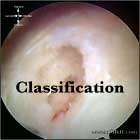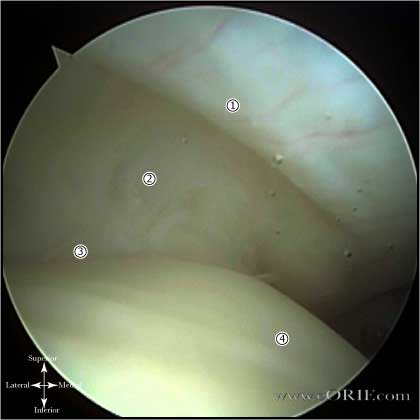|


|
Phase I –Protective Phase (0 to 6 weeks)
- Abduction immobilizer / sling for 6 weeds with the arm in slight abduction (45° to 60°, promotes better blood flow to the supraspinatus, minimize tension on the repair), may take off to eat, shower, and to use arm for desk work.
- NO ACTIVE SHOULDER motion for 6 weeks.
- Active elbow, wrist and digit ROM – use putty.
- Pendulum exercises.
- Supine active assisted forward elevation (FE) to pain tolerance.
- Once patient understands the difference between active and passive motion, the patient should start home passive FE with pulleys system.
- Passive Forward elevation up to 140°.
- Passive external rotation up to 40°.
- Passive abduction to 75°.
- Use modalities to control pain and swelling (i.e. ice, HVGS, TENS).
- Home exercise program should be established so patient performs exercises 3-5 times per day.
- Add active assisted IR behind back and shoulder extension (Wand, T-bar exercises, etc.) at 4 weeks.
Phase II – Intermediate phase (6 to 12 weeks)
- Discontinue shoulder immobilizer.
- Progess from active-assisted ROM to active ROM exercises.
- Begin strengthening / resisted motion exercises at 12 weeks.
- Forward elevation up to 160°.
- External rotation up to 60°.
- Abduction to 90°.
Phase III –Strengthening (10 to 24 weeks)
- Full ROM.
- Progressive Resistance Exercises. Start light, progress as tolerated.
- Wall pushups, press-ups.
- Total Gym – rows, presses, pullovers.
- Rockwood exercises – flex, abd, ext, add, IR, ER, rows, presses.
- Can use dumbbells or theraband tubing for Rockwood exercises.
- Cybex strength testing – goal >85% of contralateral side at 20 weeks.
- Start sport specific rehab.
Phase IV – Return to Activities (After 6 months)
- Work on focal deficits.
- Establish a home program.
- Continue sport specific rehab.
- Improvement continues for 12 months post op.
For Detailed Rehabilitation protocols see:
- Brotzman SB, Clinical Orthopaedic Rehabilitation, Mosby, 2003
|